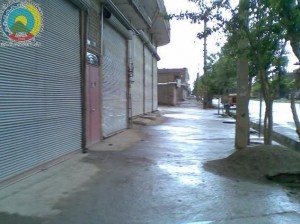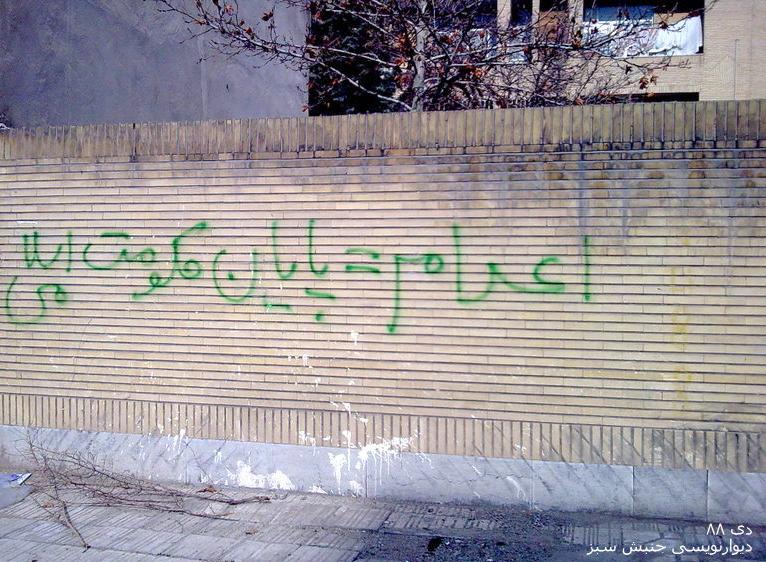The Latest from Iran (17 May): Let's Make a Deal (But Not with You, Mousavi)
 Monday, May 17, 2010 at 19:04
Monday, May 17, 2010 at 19:04  2120 GMT: We close tonight with an analysis by Gary Sick, posted in a separate entry, of today's Tehran agreement on uranium enrichment.
2120 GMT: We close tonight with an analysis by Gary Sick, posted in a separate entry, of today's Tehran agreement on uranium enrichment.2045 GMT:Political Prisoner Watch. Literary critic Abbas Khalili Dermaneh (also known as Khalil Dermaneki) has been released after almost five months in detention. Dermaneh was arrested during the Ashura demonstrations on 27 December.
Ahmad Yazdanfar, the head of Mir Hossein Mousavi's security detail, has been arrested.
NEW Iran Analysis: Assessing the Tehran Nuclear Deal (Gary Sick)
NEW Iran Document: Text of Iran-Brazil-Turkey Agreement on Uranium Enrichment
NEW Iran Document: Mehdi Karroubi “The Islamic Republic Depends Upon the People”
NEW Iran Document: The Prosecutor on the Executions, “Leaders of Sedition” (15 May)
NEW Iran Urgent: The Deal on Uranium Enrichment
Iran Blackout: Shutting Down the Movies
The Latest from Iran (16 May): Intimidation After the Executions
1800 GMT: Political Prisoner Watch. Writer and children's rights activist Reza Khandan was released last Wednesday. Peyke Iran claims that that international pressure contributed to the decision to free him.
1440 GMT: Karroubi's "Islamic Republic Depends on the People". We have posted the English translation of Mehdi Karroubi's latest rallying call for the Iranian people to defend the Republic.
1415 GMT: Political Prisoner Watch. Amir Kabir University student Mohammad Yousefi has been released after six months in detention.
1150 GMT: More "It's Still War!" MediaFail (see 1024 GMT). It's one thing for The New York Times to package this morning's Iran-Brazil-Turkey deal as, first and foremost, a complication for sanctions. Even if their "experts" are doing no more than speculating --- "The terms mirror a deal with the West last October which fell apart when Iran backtracked. This time, however, those same terms may be unacceptable to Washington and its partners because Iran has since increased its supply of nuclear fuel" --- at least there is the guise of analysis rather than Government spin.
Reuters, however, has no excuse. The agency ran the scare story last Friday from "Western diplomats" that Iran must be preparing for militarised nuclear capability because it was enriching uranium to 20 percent, rather than sending it abroad. So what happens when Iran does agree to send the uranium abroad?
Well, Reuters calls "Western diplomats" --- possibly the same ones who fed them their Friday article --- to get quotes:
"If they refuse to stop enriching to 20 percent and make this proposal for fuel, then why are they continuing the higher enrichment [with their own centrifuges]? There is no other peaceful justification," a Western diplomat said. [NOTE: The "peaceful justification" is that Iran may not get enriched uranium for up to a year, even if this morning's deal goes through with the US and other powers.]
"This would be a deal-breaker," another said.
1120 GMT: Nuclear Question of the Day/Week/Month. We're continuing special updates in a separate entry on today's Iran-Brazil-Turkey deal on uranium enrichment, and we have posted a copy of the agreement.
An EA correspondent, meanwhile, asks the key question about Iranian politics. We all know that President Ahmadinejad, seeking legitimacy, has pursued an agreement since last summer, but "why are the Supreme Leader and Speaker of Parliament Ali Larijani, who opposed last October's deal, now supporting it?"
1030 GMT: Academic Corner. Four students from Elm-o-Sanat University in Tehran have been expelled for political opposition.
1024 GMT: CNN on Iran Nuclear Deal "It's Still War!" A hopeless display of journalism from CNN this morning....
Instead of trying to get to grips with the possible significance of the deal announced by Iran, Brazil, and Turkey, CNN's website goes back to the older scare story --- circulated by "Western diplomats" on Friday --- of Iran putting in a second cascade of centrifuges to provide 20-percent enriched uranium for its Tehran Research Reactor, producer of medical isotopes (see Saturday's updates).
True, Foreign ministry spokesman Ramin Mehmanparast told the Islamic Republic News Agency this morning that Iran would continue this process but --- since arrangements for a swap of Iran's 3.5-percent uranium for 20-percent uranium in Turkey may not be completed until mid-2011 --- that would seem a logical step to keep the TRR going.
So here's CNN gambit: "20-percent enriched uranium is the threshold for uranium capable of setting off a nuclear reaction. And Western leaders have alleged that Iran is trying to create nuclear weapons under the guise of a civilian energy program."
Umm... "Threshold for a nuclear reaction". Not threshold for even a single bomb, which is more than 90 percent.
0750 GMT: Karroubi Watch. Mehdi Karroubi, meeting academics, doctors, nurses, and families of martyrs, has asserted that the Islamic Republic was only born through people's votes; therefore, the Republic derives its meaning from the people.
0730 GMT: The Nuclear Deal. We will be providing updates on today's agreement between Brazil, Turkey, and Iran in a separate entry.
Meanwhile, the key (and probably unasked) question on the internal dimension: what legitimacy will the Ahmadinejad Government claim (and what legitimacy will it obtain) from the agreement? Not sure if anyone has noticed, but there seems to be an anniversary coming up on 12 June....
0720 GMT: Intimidation. Following the public threat to Mir Hossein Mousavi from the Tehran Prosecutor General and the letter by 175 members of Parliament calling for prosecution of Mousavi and Mehdi Karroubi (see yesterday's updates), Khabar Online offers a timeline of the warnings to Mousavi and Karroubi.
0620 GMT: We open this morning with updates on two important stories.
Media inside and outside Iran will likely be focused on news of agreement between Iran, Brazil, and Turkey on a procedure for a deal on enrichment of Tehran's uranium. We've got the latest developments and what to watch for today.
Inside Iran, however, the political story is the continued effort by the Government to defend the executions, now more than a week old, of 5 Iranians. We have a transcript of Saturday's lengthy statement by Tehran Prosecutor General Abbas Jafari Dowlatabadi justifying the hangings.
However, just as significant in the statement --- despite Dowlatabadi's extended denial that the timing of the executions has any political significance --- is his high-profile warning to Mir Hossein Mousavi. The Tehran Prosecutor's references to Mousavi's position as Prime Minister in the 1980s, during a period when many Iranians were executed, should not be missed: you supported them then, so why trumpet public opposition now?
Then there is Dowlatabadi's pointed declaration to the "leaders of sedition": we've seen you denounce this execution of rightfully-condemned terrorists, we've noted it, and we will add it to the list of charges against you.
Absolutely no connection to the 12 June anniversary of the Presidential election, with the possibility of opposition demonstrations, whatsoever.




